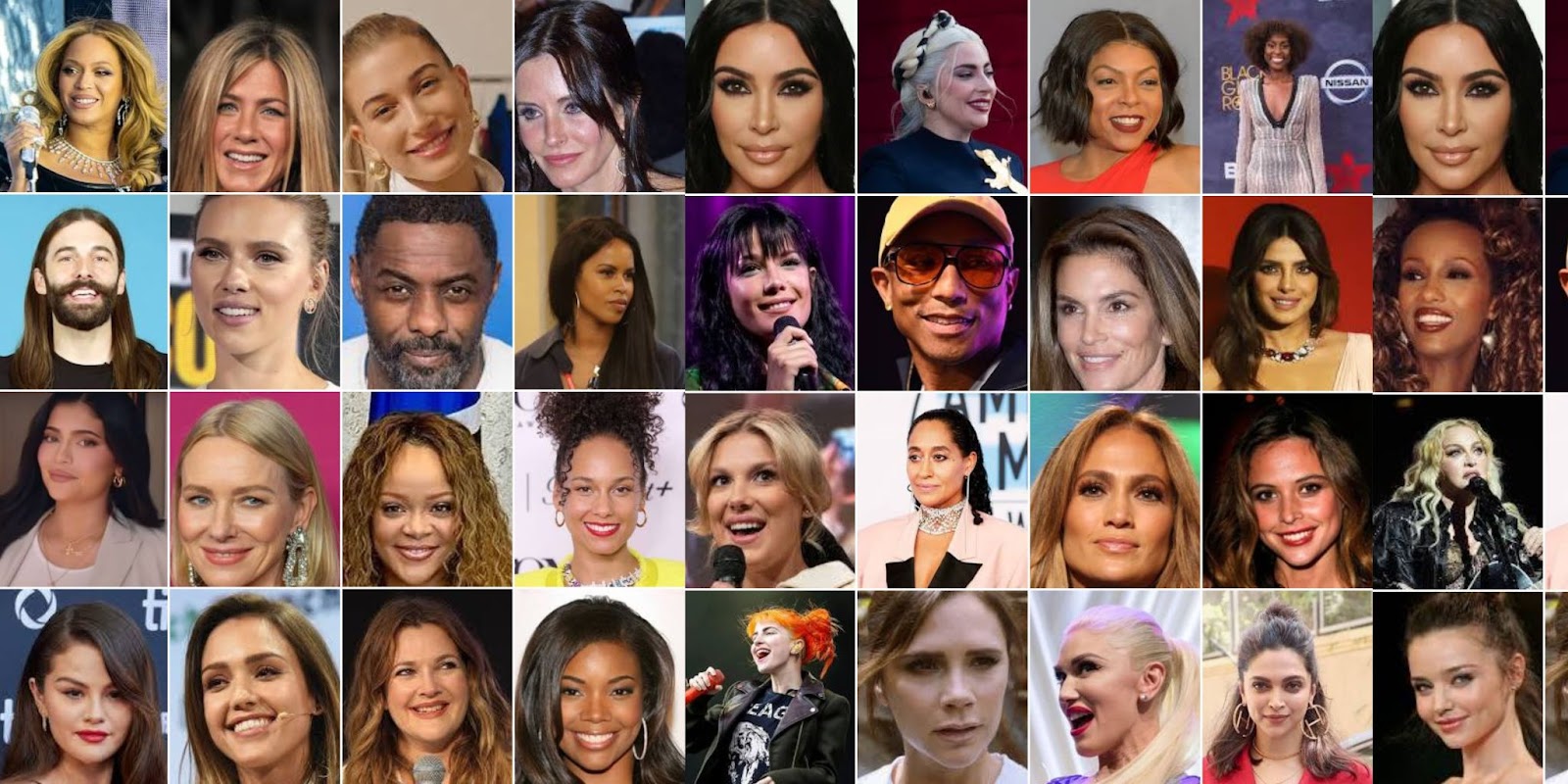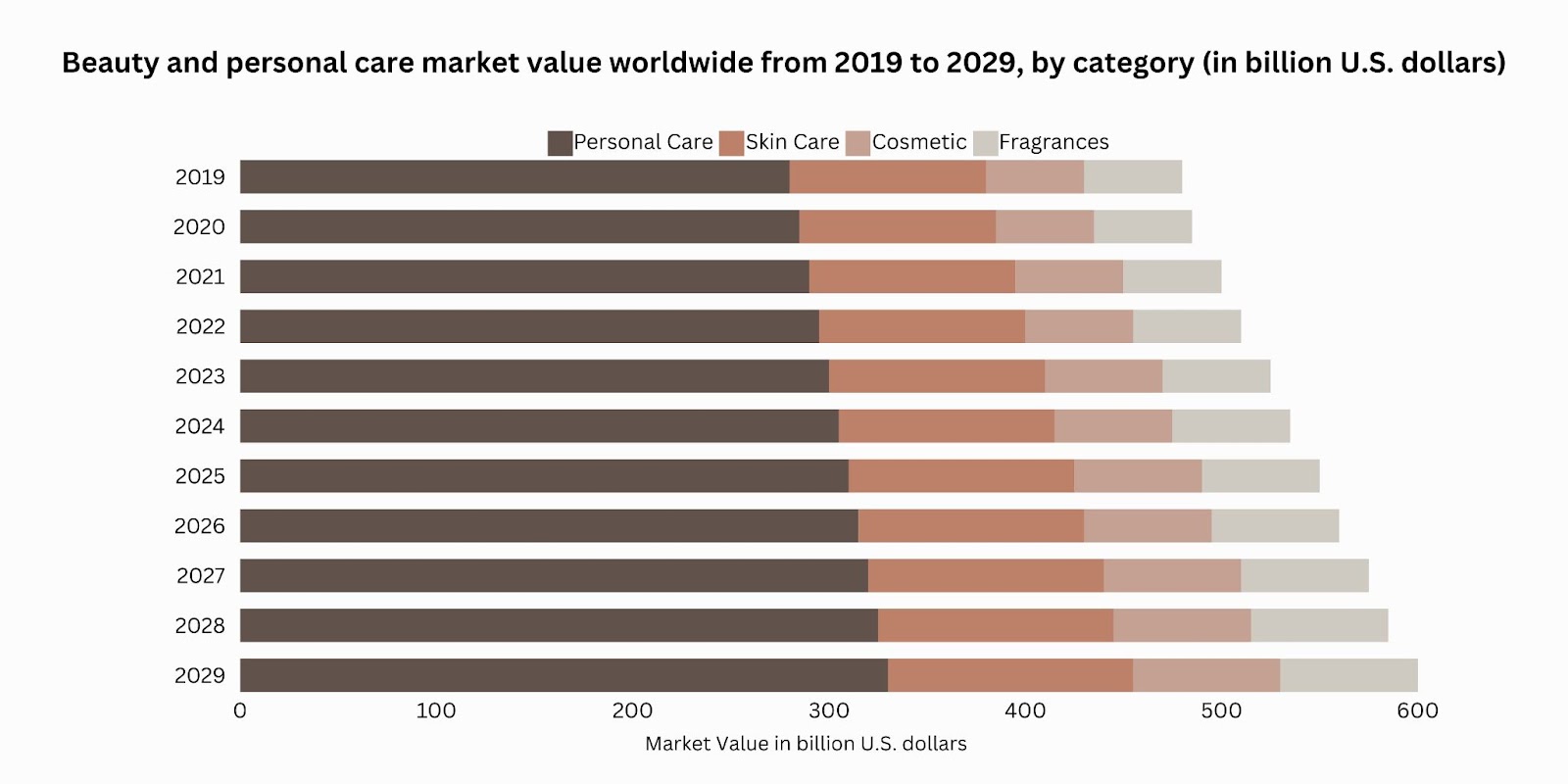Celebrity beauty brands enjoy a distinct advantage because they quickly gain recognition and demand because of the trust and admiration their founders have already built. Since many people idolize the beauty and lifestyle of celebrities their brands often need little advertising and effort to establish a solid market presence. This mirrors the reason why numerous products opt for celebrities, actors, and influencers as brand ambassadors, their mere presence can enhance a product’s credibility and appeal, leading to successful market placement.
Who is your favorite celebrity, and which of their beauty brands have you tried? Share your experience and let us know your top picks! (the box can be six column to make it not long while putting it on web)
Celebrity Beauty Brands

| Celebrity Name | Beauty Brand | Star Product |
| Beyoncé | Cécred | Moisturizing Deep Conditioner |
| Serena Williams | WYN Beauty | Hydrating Skin Enhancing Tint |
| Jennifer Aniston | LolaVie | Perfecting Leave-In |
| Hailey Bieber | Rhode Skin | Peptide Lip Treatment |
| Courteney Cox | Homecourt | CeCe Candle |
| Jonathan Van Ness | JVN Hair | Nourishing Shine Drops |
| Scarlett Johansson | The Outset | Firming Vegan Collagen Prep Serum |
| Idris & Sabrina Elba | S’Able Labs | Black Seed Toner |
| Kylie Jenner | Kylie Cosmetics | Power Plush Longwear Concealer |
| Ariana Grande | r.e.m. Beauty | Midnight Shadows Lustrous Liquid Eyeshadow |
| Naomi Watts | Stripes | Cool Factor Face Mist |
| Rihanna | Fenty Beauty & Fenty Skin | Gloss Bomb |
| Alicia Keys | Keys Soulcare | Be Luminous Exfoliator |
| Selena Gomez | Rare Beauty | Perfect Strokes Matte Liquid Liner |
| Jessica Alba | Honest Beauty | Fresh Flex Concealer |
| Drew Barrymore | Flower Beauty | Flower Pots |
| Gabrielle Union | Flawless | Hydrating Co-Wash Cleansing Hair Conditioner |
| Lady Gaga | Haus Labs by Lady Gaga | Hy-Power Eye, Cheek & Lip Pigment Paint |
| Kim Kardashian | SKKN by Kim | The Exfoliator |
| Halsey | About-Face | Shadowsticks |
| Millie Bobby Brown | Florence by Mills | What’s My Line? Eyeliner |
| Hayley Williams | Good Dye Young | Semi-Permanent Hair Color |
| Pharrell Williams | Humanrace | Rice Powder Cleanser |
| Tracee Ellis Ross | Pattern Beauty | Leave-In Conditioner |
| Victoria Beckham | Victoria Beckham Beauty | Future Lash Mascara |
| Taraji P. Henson | TPH by Taraji | Master Cleanse |
| Michelle Pfeiffer | Henry Rose | Windows Down Eau de Parfum |
| Issa Rae | Sienna Naturals | Plant Power Repair Mask |
| Cindy Crawford | Meaningful Beauty | Revive & Brighten Eye Masque |
| Miranda Kerr | Kora Organics | Noni Glow Face Balm |
| Josie Maran | Josie Maran Cosmetics | 100% Pure Argan Oil |
| Priyanka Chopra Jonas | Anomaly Hair Care | Clarifying Shampoo |
| Deepika Padukone | 82°E | Lotus Splash Hydrating Face Wash |
| Gwen Stefani | GXVE Beauty | Anaheim Shine Lipstick |
| Jennifer Lopez | JLo Beauty | That JLo Glow Serum |
| Jessica Simpson | BeautyMint | Custom Skincare System |
| Madonna | MDNA Skin | The Reinvention Cream |
| Iman | Iman Cosmetics | Luxury Concealing Foundation |
Worldwide Cosmetic Industry Facts
The cosmetics industry is growing fast-paced as self-care and wellness gain importance among consumers around the globe. After a brief dip in 2020 due to the COVID-19 pandemic, the global beauty market has been on a steady upward trajectory since 2004 and is projected to reach nearly 132 billion U.S. dollars by 2029. Skincare is the leading category, making up 40% of the beauty market in 2023. The trend of “skinification,” which blends skincare benefits into makeup and haircare products, is expected to generate around 218 billion U.S. dollars in revenue by 2029. Major players in the industry include multinational corporations like L’Oréal, Unilever, Procter & Gamble, and Estée Lauder, with L’Oréal at the forefront as the world’s largest beauty manufacturer, earning over 44 billion U.S. dollars in revenue in 2023.

Ref. Statista
Social media’s influence and technological advancements drive the beauty industry’s rapid growth. Platforms such as Instagram, YouTube, and TikTok have transformed beauty marketing, enabling influencers and brands to engage directly with consumers. Live shopping and social commerce have made it easier to purchase beauty products, while innovations in beauty tech, like try-on apps and AI-driven personalization, are improving the customer experience. As these trends continue to develop, the cosmetics industry is set for even more significant growth, reinforcing its position as a major player in the global retail market.
Why Start Your Beauty Brand?
Creating a cosmetics line presents a fantastic opportunity to transform your passion into a successful cosmetic brand. For cosmetics lovers and skincare enthusiasts, it’s an exhilarating way to bring creative ideas to life while making a meaningful impact in the beauty world. It also acts as a significant outlet for artistic expression, enabling entrepreneurs to develop unique products that truly stand out. Beyond the creative aspect, running a cosmetics line or skincare line offers financial independence, allowing business owners to set their schedules, work on their terms, and dedicate their efforts to building something they genuinely care about. The beauty industry is among the fastest-growing sectors, with steady growth expected in the coming years. As skincare continues to take center stage, consumers are increasingly focused on skin health and effective results. A product that delivers high performance and tangible results can earn long-term consumer trust and maintain its relevance in the market for years to come.
Build Your Beauty Brand
Starting a skincare or cosmetic brand involves thorough planning, research, and execution to create high-quality products that can stand out in a competitive market. Here’s a detailed step-by-step guide:
Market Research & Brand Concept
Before you dive into cosmetic brand development, it’s crucial to analyze the market, spot trends, and identify your target audience. Clearly define your cosmetics brand’s mission, unique selling points (USPs), and how your products will differ from others.
Product Formulation & Development
Collaborate with cosmetic chemists or formulators to create safe, effective, and innovative skincare products. Pay attention to ingredient sourcing, sustainability, and how well the products work for different skin types.
Prototyping & Stability Testing
Develop initial samples and evaluate them for texture, absorption, fragrance, and effectiveness. Conduct stability and compatibility tests to ensure the product remains consistent over time and under various conditions.
Laboratory & Safety Testing
Perform microbial, dermatological, and allergen testing to verify product safety. Adhering to cosmetic regulations is vital to avoid potential legal and health issues down the line.
Packaging Design & Branding
Select packaging that reflects your cosmetics brand identity while also being functional and sustainable. Create an attractive logo, product labels, and marketing materials that will draw in consumers.
Compliance & Regulatory Approvals
Make sure your products comply with the necessary legal and regulatory standards in the markets where you intend to sell (e.g., FDA in the US, CPNP in the EU, UK’s MHRA, ESMA & the DM in Dubai). Obtain any required certifications like cruelty-free, organic, or vegan, if relevant.
Manufacturing & Production
Choose a trustworthy manufacturer that adheres to quality standards. Decide whether to produce in-house or outsource to a contract manufacturer. Ensure strict quality control throughout the production process.
Marketing & Brand Positioning
Craft a robust marketing strategy that includes social media, influencer partnerships, digital advertising, and content marketing. Create an engaging online presence. Build a strong online presence and share informative content about the benefits of skincare.
Distribution & Sales Strategy
Identify the channels for selling your products whether through e-commerce, retail stores, beauty boutiques, or direct-to-consumer. Consider partnering with distributors if you aim to enter larger markets.
Launch & Customer Engagement
Create a successful product launch by combining online and offline marketing strategies. Provide samples, run promotional campaigns, and interact with customers through reviews, testimonials, and engaging content.
Continuous Improvement & Expansion
Collect customer feedback, track sales performance, and enhance your products or introduce new lines based on market demand and trends. Stay innovative and responsive to changing skincare needs.
Support For Your Beauty Brand Building
All the above-mentioned steps may feel unattainable as a starter or as a fully engaged person. But Avarten has got your back. At Avarten, we don’t just offer guidance, we create your brand from the ground up, turning your ideas into a successful, globally recognized cosmetic business. We manage everything from formulation and packaging to regulatory approvals and market placement, leveraging our industry expertise. Your only responsibility? Share your vision. We’ll handle the rest.
With our vast experience in luxury cosmetics and ingredient distribution, we ensure that your products not only comply with industry standards but also shine as premium offerings in the beauty market. Place your product like a celebrity brand and achieve the same level of success.
Fill OUT the form on the page to start building your brand



